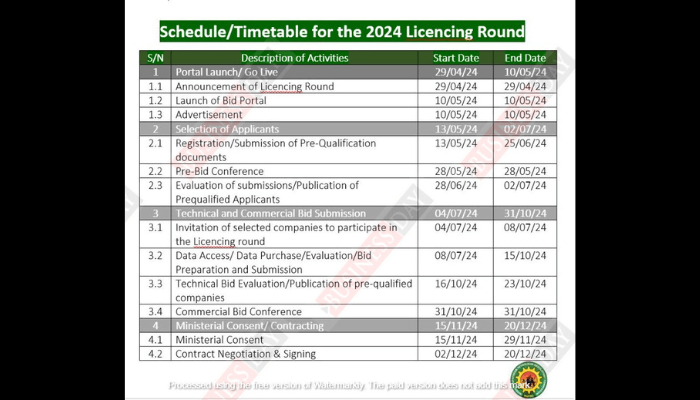… ministerial consent expected in December
Potential investors have gotten the federal government’s guidelines for the 2024 oil licensing round for 12 oil bloc sales, BusinessDay’s findings have revealed.
An exclusive document on the timetable for the 2024 bid round seen by BusinessDay showed the round will span nine months and conclude with ministerial consent and contracting in January 2025.
According to the regulatory agency, Nigerian Upstream Petroleum Regulatory Commission (NUPRC), the registration/submission of requalification documents is currently ongoing and will end on June 26, 2024.
A Pre-Bid Conference is scheduled for May 25, 2024, and the evaluation of submissions/publication of prequalified applicants is expected to run from Jun 28 to July 2, 2024.
NUPRC will invite selected companies to participate in the licencing round on July 4, a process that is scheduled to end on July 8.
The commission will then open up its portals for data access/ data purchase/evaluation/bid preparation and submission. That process will last for more than three months from July 8 to October 15, 2024.
For seven days between October 16, 2024 and October 17, 2024, the NUPRC is expected to commence technical bid evaluation and publication of prequalified companies while ministerial consent and contract negotiation are expected between November 15 2024 and December 20 2024.
“Nigeria holds 36.966 billion barrels of oil, which ranks her 2nd in Africa, 8th in OPEC and 11th in the world,” the NUPRC promotional material said.
It added, “Nigeria is also richly endowed with 208.83 trillion cubic feet (Tcf) of Natural Gas reserves with upside potential estimated at 600 Tcf.”
The move is part of President Bola Tinubu’s drive to attract investment into Nigeria’s moribund oil and gas sector, amid the exit of supermajors from the country’s hydrocarbon-rich swamp plays.
The 12 blocks in the new round were carefully selected to attract international investors with financial resources and technical expertise and are spread across three geological terrains, Gbenga Komolafe, upstream regulator NUPRC’s chief executive said.
Norwegian geophysical services company PGS, which is providing seismic data support for the licensing round, said two of the blocks on offer are onshore in the Niger Delta, six are on the continental shelf and the other four are in deep water.
Entry fees will be competitive as part of government measures to support the commercial viability of investments, according to Komolafe. “The era of front-loaded, huge signature bonuses is over,” he said.
Heineken Lokpobiri, Nigeria’s oil minister echoed Komolafe’s point about minimal barriers to entry but noted that the round is designed to bind successful bidders to strict timelines, suiting investors that are “able to do exploration almost immediately”.’
Lokpobiri also revealed that Nigeria plans to award licences for seven offshore blocks offered in a 2022 licensing round in tandem with the 2024 round.
“The 19 oil blocks presented for bidding are strictly reserved for capable investors,” he said.
NUPRC said in April last year that the schedule had been pushed back to July because of concerns about concluding “the bid process before transition to the new government”.
Tinubu’s administration took office on 29 May last year but progress on the 2022 licensing round stalled.
He had set a target to raise Nigeria’s crude production to 2.6 million barrels per day( bpd) by 2027. The country’s current target under the Organisation of Petroleum Exporting Countries agreement is just 1.5m bpd.
Nigeria started an international roadshow for the new licensing round in the United States on 7 May in Houston, Texas. On Tuesday, the road show moved to Miami, in the state of Florida, in the United States.
